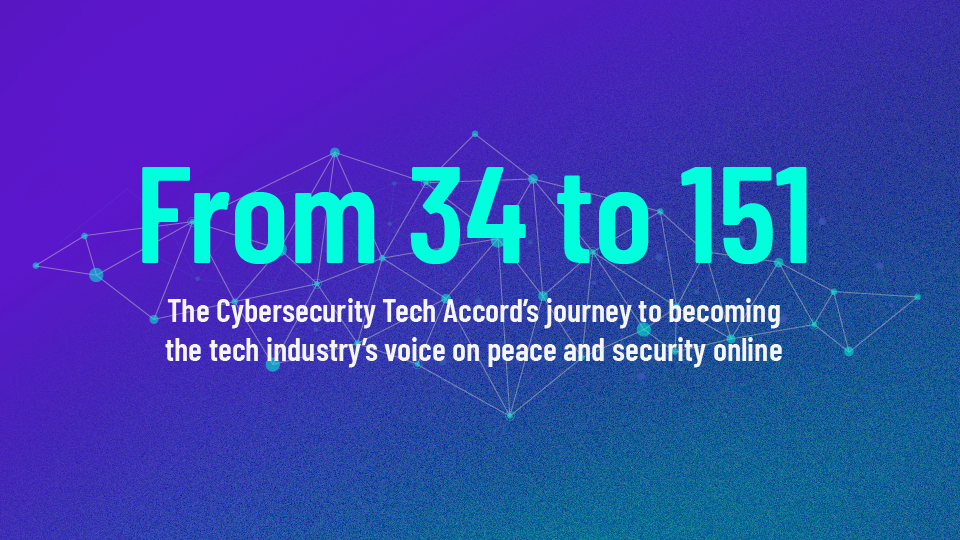Last year, the phrase “better together” became the slogan to capture the importance of the collective efforts of people everywhere to respond to, and mitigate against, the far-reaching effects of COVID-19. A shared global challenge requires such cooperation and clarity of purpose. This sentiment resonates with the Cybersecurity Tech Accord because for nearly three years now we have worked in a similar vein to unite the technology industry behind common values to address escalating threats online – putting our users and customers first and advocating against corrupting technology products that cause harm to innocent civilians and organizations. Today, we are proud to announce that this commitment at the core of our organization has more than 150 company signatories from around the world!
Amid increasingly sophisticated cyberattacks, heightened further by a global pandemic, our commitment to promote a safer online world is more important than ever before. While individuals and organizations have come to rely on technology and the internet, this shift to cyberspace has also revealed more opportunities for bad actors to escalate conflict online. Earlier this year, we released a study in partnership with the Economist Intelligence Unit on the corporate perceptions of nation-state cyber-threats. The survey found that COVID-19 accelerated cyberattacks on a range of targets, such as government agencies, critical infrastructure, healthcare entities, and even private citizens. Further, respondents noted that stronger international economic and political cooperation is essential in addressing these challenges. These findings align with the Cybersecurity Tech Accord’s call for greater action by governments in this area and highlight the importance of our global efforts to engage in on-going discussions with a multi-stakeholder community to address peace and security challenges online.
In April 2018, 34 technology companies joined the Cybersecurity Tech Accord based on a commitment to four fundamental principles: stronger defense, no offense, capacity building and collective action. Since then, the Cybersecurity Tech Accord has become the largest industry-led effort of its kind, and in the last year has welcomed 10 new companies: Crayonic, DXC Technology Company, Eaton Corporation, Greenlight Information Services, Logrythm Africa, Moback Inc, NEC Corporation, RedSeal, Securesoft Corporation and Wallencore. Their expertise spans the technology industry and represents geographically diverse regions, including Africa, Asia, Europe, Latin America, and North America. This addition of new companies also crosses another milestone by bringing us to a total of 151 signatories, demonstrating our growth and collective influence as an industry to help improve the security, stability and resilience of cyberspace.
“Over the last three years, the Cybersecurity Tech Accord has grown immensely and accomplished a lot. We extend a warm welcome to all of our new signatories and look forward to what more we can accomplish together,” said Annalaura Gallo, head secretariat of the Cybersecurity Tech Accord. “This milestone is so much more than a number; our growth represents the industry-wide commitment to improve the security, stability, and resilience of cyberspace.”
In the last year, the Cybersecurity Tech Accord signatories supported several initiatives crucial to bringing our message to government organizations, civil society, and industries around the world. These efforts included partnerships with the United Nations Envoy on Youth on the Apps 4 Digital Peace competition, and contributing responses to initiatives such as the Geneva Dialogue on Responsible Behaviour in Cyberspace, and calling on the UN General Assembly to prioritize digital trust and security. Further, we continued to promote the Paris Call on Trust and Security in Cyberspace by releasing helpful resources encouraging cyber hygiene with a three-part video and blog series, as well as publishing the Cyber Hygiene Compendium and White Paper against hack backs.
We look forward to new partnership and engagement opportunities to raise these critical topics with stakeholders globally and are excited to continue the necessary work to safeguard our online environment and advocate for all users.


